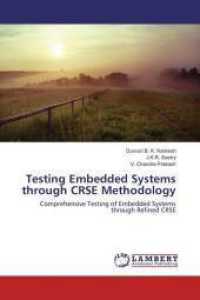- ホーム
- > 洋書
- > ドイツ書
- > Social Sciences, Jurisprudence & Economy
- > Education Science / Pedagogic
- > didactics, methodics, school education
Full Description
This volume is dedicated to the concept and several applications of Dominant Language Constellations (DLC), by which it advances understanding of current multilingualism through addition of a novel perspective from which to view contemporary language use and acquisition.








